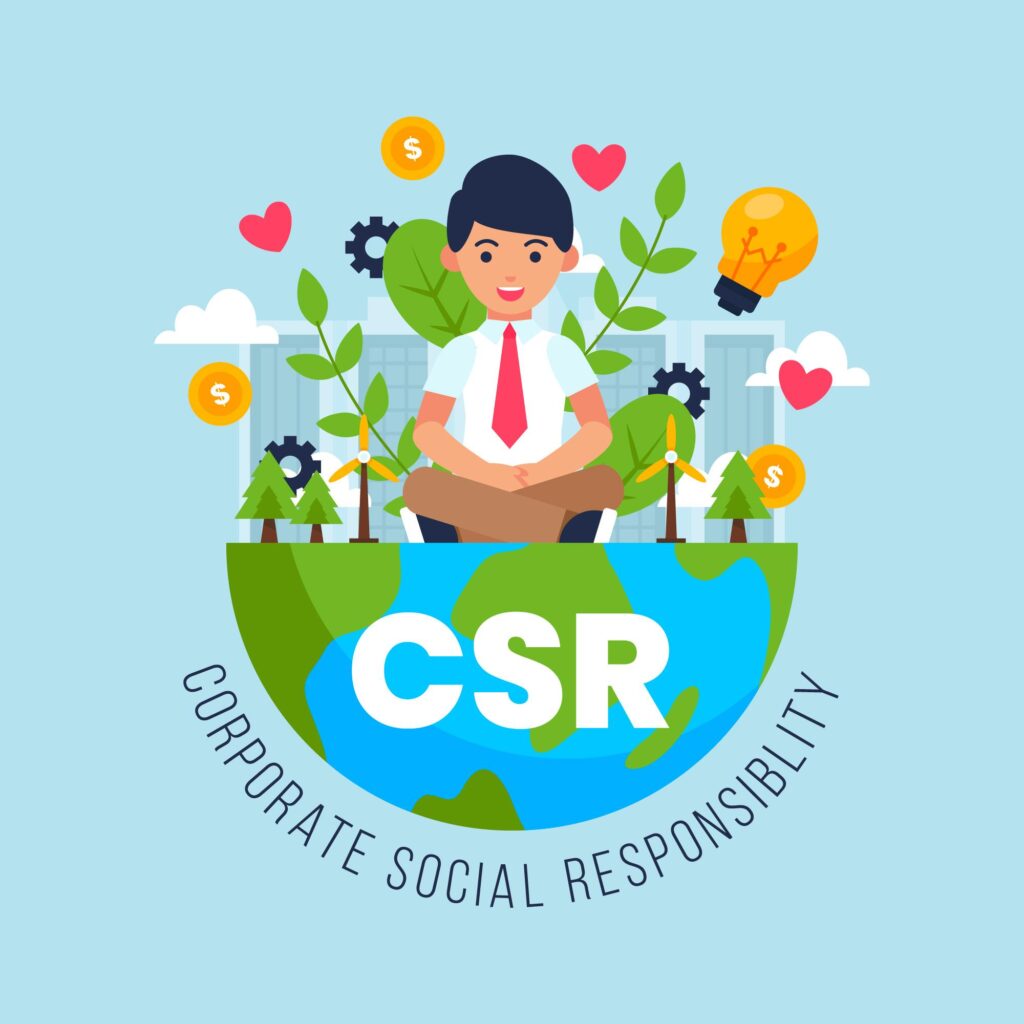As the world grapples with pressing challenges like poverty, inequality, and climate change, businesses are increasingly expected to play a vital role in driving positive change. The United Nations’ Sustainable Development Goals (SDGs) offer a blueprint for addressing these issues, and Corporate Social Responsibility (CSR) has emerged as a key catalyst for progress. Private enterprises, by harnessing the power of CSR, can unlock new opportunities for corporate growth, innovation, and social impact, while meaningfully contributing to a more sustainable and equitable world. This article explores the dynamic intersection of CSR and SDGs, highlights the benefits, challenges, and best practices for businesses to make a difference in today’s world.
Corporate Social Responsibility and Sustainable Development Goals
Corporate Social Responsibility (CSR) is a business approach that integrates social, environmental, and economic considerations into a company’s operations, beyond mere profit-making. It involves voluntary efforts to improve social, environmental, and economic outcomes, and is often seen as a way for businesses to give back to society.
The Sustainable Development Goals (SDGs), adopted by the United Nations, are a set of 17 global objectives aimed at addressing the world’s most pressing challenges, such as poverty, inequality, and climate change. At 92 Media Ventures, under the 92 Sustainable Development Initiative, we focus on five critical SDGs:
- SDG 4: Quality Education
- SDG 5: Gender Equality
- SDG 8: Decent Work and Economic Growth
- SDG 10: Reduced Inequalities
- SDG 17: Partnerships for the Goals
The intersection of CSR and SDGs presents a compelling opportunity for businesses to contribute to achieving these goals. By aligning their CSR efforts with the SDGs, companies can create positive impact, enhance their reputation, and contribute to a more sustainable future. Moreover, this alignment provides global relevance, exposing businesses to a wide range of opportunities, including access to new markets, customers, and partnerships, as well as the chance to shape the global agenda and policy discussions. This integration can also drive business benefits, such as: improved brand reputation and customer loyalty, increased employee engagement and retention, better risk management and regulatory compliance, and enhanced collaboration and partnerships.
Benefits of Corporate Social Responsiblity for SDG Achievement
Better Brand Reputation and Brand Loyalty
When companies demonstrate their commitment to global issues through public endorsements of the SDGs, transparent reporting of their SDG-aligned activities, employee volunteer programs, and sustainable products, it builds trust with customers. This is because it shows they possess shared values with their customers, ensure accountability, and make efforts towards addressing global challenges. This in turn leads to loyalty, recommendations, and a strong brand reputation.
Improved Employee Engagement and Talent Attraction
By offering skills-based volunteer programs, SDG-focused training and development opportunities, and inclusive decision-making processes, companies can boost employee morale and attract top talent. This also leads to increased productivity at work, reduced turnover rates, and enhanced collaboration within and outside the company.
Innovation and Competitiveness
Companies can drive innovation by addressing SDGs through cross-functional teams that combine their business, technical, and sustainability expertise. By leveraging design thinking, they can develop new products and services, and investing in R&D focused on sustainable technologies. This leads to the creation of new business models, increased competitiveness, and market share growth.
Risk Management and Regulatory Compliance
To mitigate risks and ensure compliance, companies can conduct regular impact assessments using tools like the SDG Impact Standards, engaging stakeholders through surveys and feedback mechanisms, and integrating SDG considerations into business decision-making processes through SDG-aligned KPIs. This reduces reputational damage, regulatory fines, and operational disruptions.
Access to New Markets and Partnerships
Companies can have access to new markets and partnerships by prioritizing SDGs in market research and analysis. This process helps in the development of tailored products and services that address local needs. It also fosters collaboration with local stakeholders, NGOs, and government agencies to support the achievement of the SDGs. This expands customer bases, increases revenue streams, and enhances global influence.
Challenges and Opportunities in Leveraging Corporate Social Responsibility for SDG Achievement
Companies face significant challenges when aligning their CSR initiatives with the SDGs. One of the main hurdles is adapting business operations and strategies to prioritize SDG achievement, which can require substantial changes to existing practices. Additionally, measuring and reporting progress towards SDGs can be difficult due to limited data and standardized metrics, making it hard to track impact and progress.
Another challenge is balancing short-term needs with long-term SDG goals, which often requires making trade-offs and prioritizing certain objectives over others. Engaging stakeholders, including employees, customers, and suppliers, to support SDG efforts can also be a challenge, as it requires building awareness, generating interest, and fostering a sense of ownership among diverse groups. Furthermore, companies must address skepticism and criticism from stakeholders who may view CSR efforts as insincere or inadequate, which can damage reputation and undermine progress.
Despite these challenges, there are opportunities for companies to innovate and grow. By developing solutions and business models that address SDG-related challenges, companies can enhance their reputation and brand loyalty by demonstrating a genuine commitment to SDGs. Prioritizing SDGs in business strategies can also open up new markets and partnerships, particularly in emerging economies where SDG achievement is critical. Moreover, integrating SDG considerations into risk management and regulatory compliance can help companies avoid potential pitfalls and ensure long-term sustainability. Finally, offering purpose-driven work and SDG-focused training and development opportunities can help attract and retain top talent, driving business success and social impact.
How to Partner With Us on the Tech4All Project
The Tech4All Project is a forward-thinking initiative designed to harness the power of technology to tackle some of the most pressing social challenges in line with the United Nations’ Sustainable Development Goals (SDGs). The aim is to empower 156 marginalized individuals with digital skills thereby promoting economic growth and social inclusion. With a detailed and easy-to-understand training program, mentorship, and internship opportunities, we are confident that this project will have a lasting impact on the lives of participants and the wider community. If you’re looking for platform to be of impact, this is the right opportunity for you to get involved. For more information, check out our landing page at https://92mediaventures.com/tech4all/
Conclusion
In conclusion, leveraging CSR for SDG achievement offers a powerful opportunity for companies to drive business success while contributing to a more sustainable and equitable future. As the global community continues to work towards achieving the SDGs, companies that prioritize CSR and SDG achievement will be well-positioned to thrive and make a lasting impact. Embracing this approach will allow businesses to unlock the full potential of CSR to drive positive change and create a better world for all.






